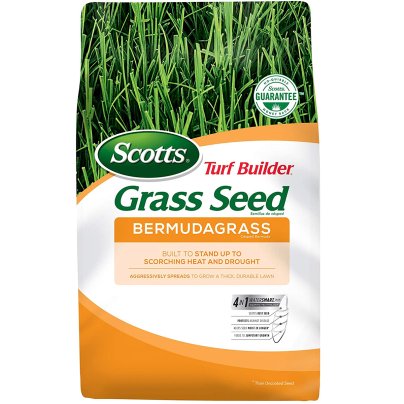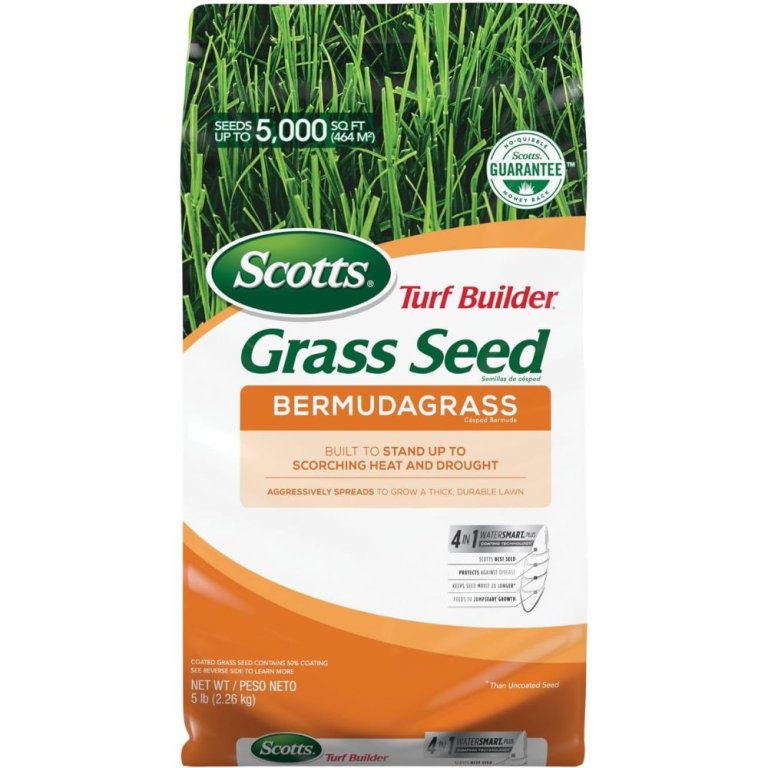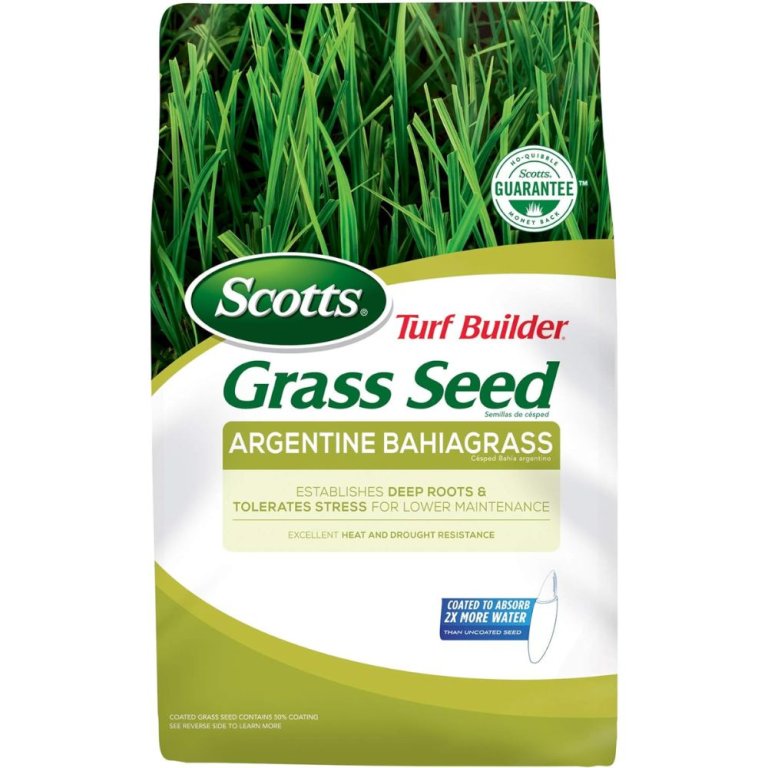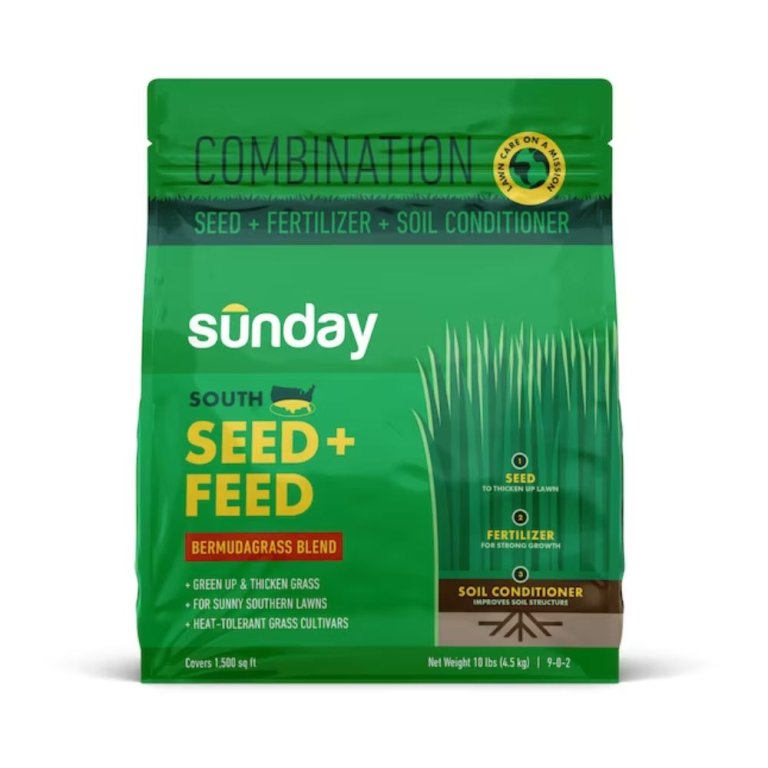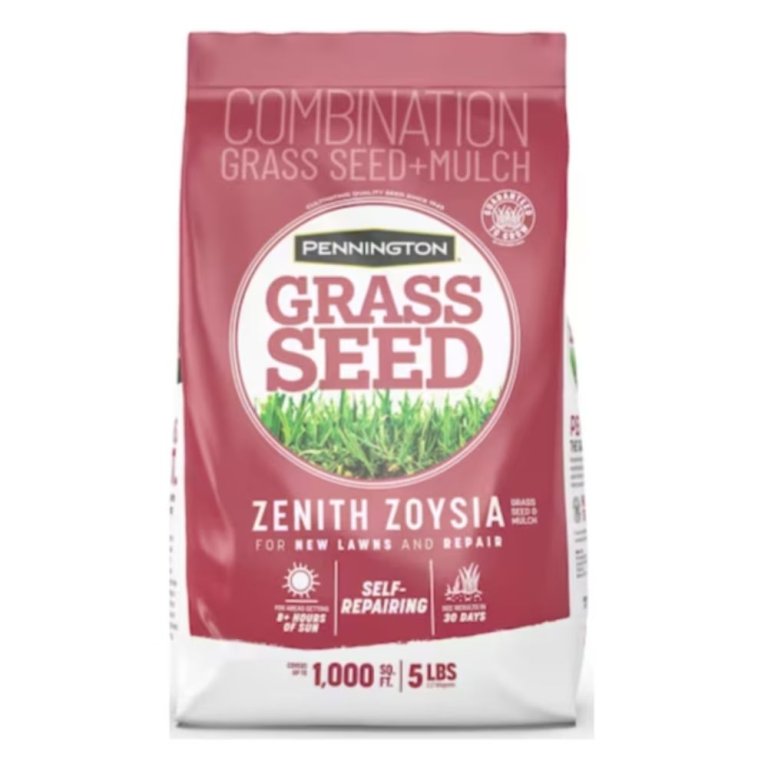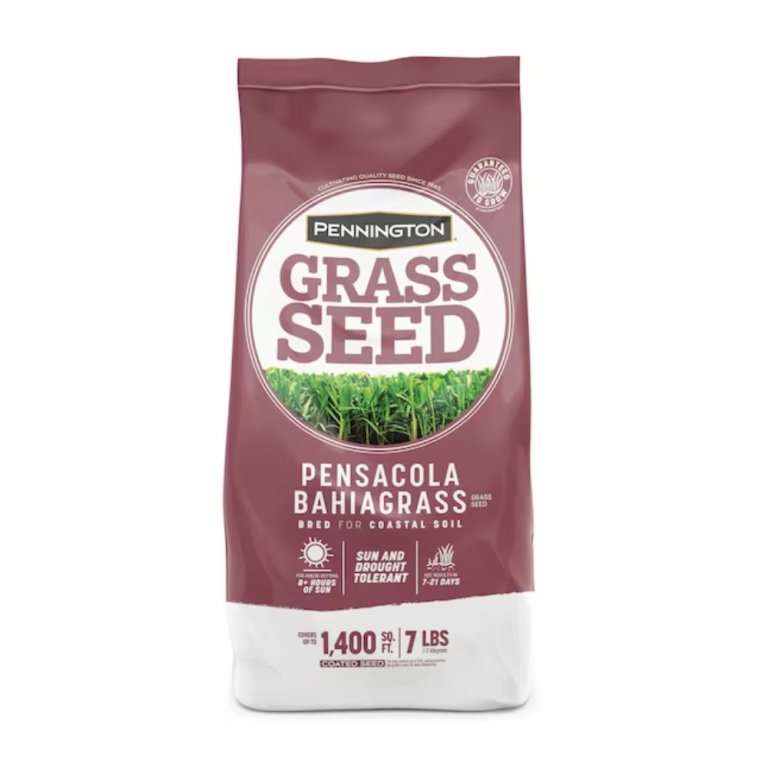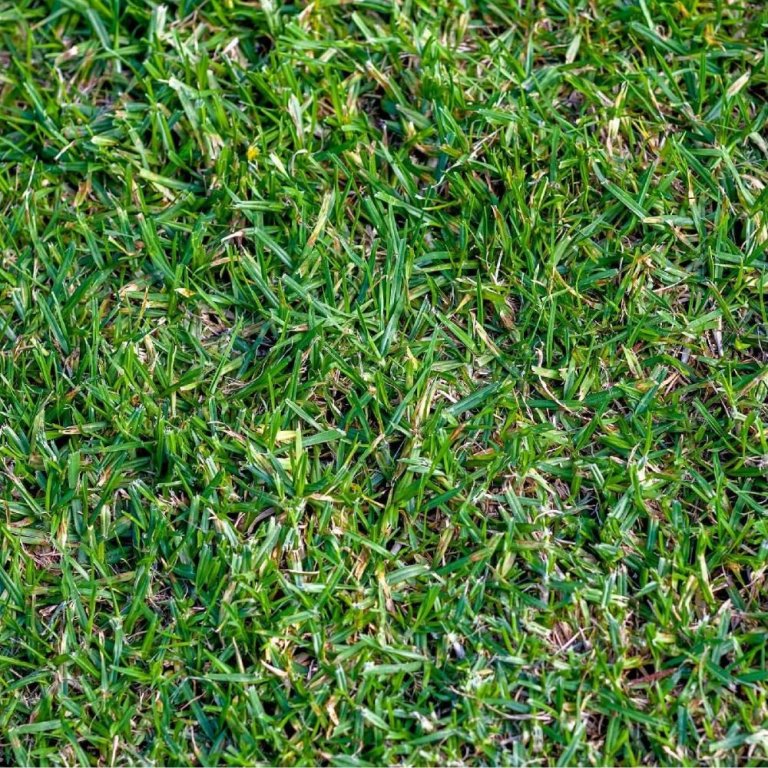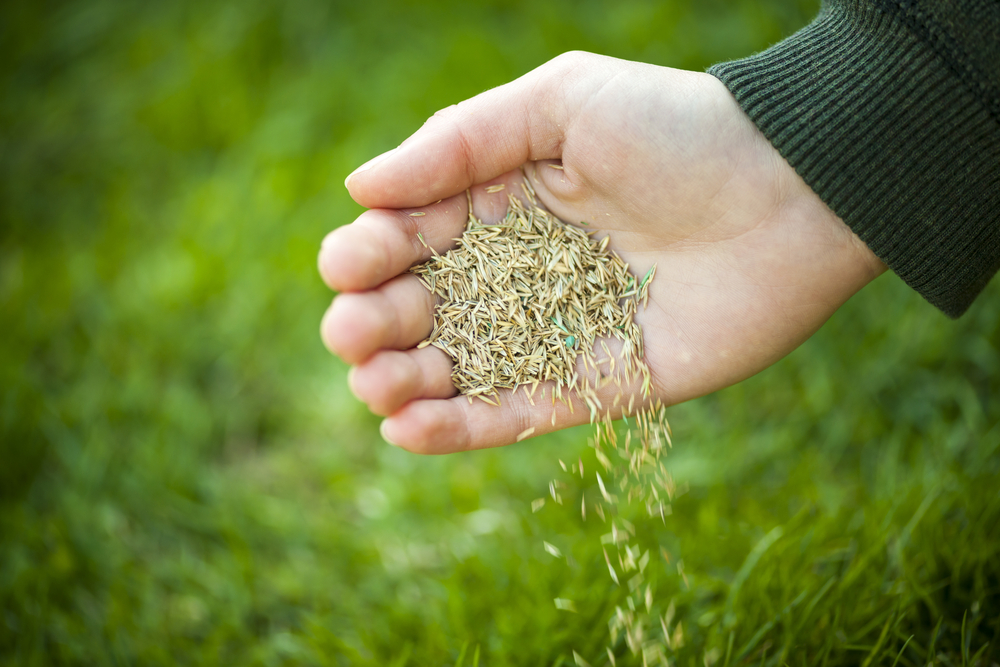
We may earn revenue from the products available on this page and participate in affiliate programs. Learn More ›
While grass dies out over the winter in most parts of the country, in Florida’s tropical and subtropical climate, home lawns can have beautiful green grass all year. Laying sod is an option, but growing a lawn from seed is a much more economical choice.
With so many types of grass seed available, it can be difficult for shoppers to narrow down their options. These recommendations for the best grass seed for Florida lawns were selected for their quality formulas, versatility, and value. However, our best overall grass seed for Florida is the Scotts Turf Builder Grass Seed Bermudagrass. It comes with enough product for new lawn seeding or overseeding, maintains and grows grass in drought-prone areas, and prevents disease and browning thanks to its WaterSmart coating.
We also interviewed Kody Ketterling, founder and creator of the lawn and garden company K-IT Products in Twin Falls, Idaho, who shares his expertise on best practices for Florida lawns: “The choice of your grass can be determined by how much water and humidity they can take and if you have the proper drainage of water through the soils,” he says.
Keep reading to learn about the key features to consider when shopping, and then explore the top picks for the best grass seed products in today’s market.
- BEST OVERALL: Scotts Turf Builder Grass Seed Bermudagrass
- RUNNER-UP: Scotts Turf Builder Grass Seed Argentine Bahiagrass
- BEST BANG FOR THE BUCK: Sunday South Seed + Feed Natural Bermuda Grass Seed
- BEST FOR MIXED LIGHT: Scotts Turf Builder Centipede Grass Seed & Mulch
- BEST FOR FULL SUN: Pennington Zenith Zoysia Grass Seed & Mulch
- BEST DROUGHT-TOLERANT: Pennington Pensacola Bahiagrass
- BEST NATIVE GRASS: Everwilde Farms Buffalo Grass Native Grass Seeds

| Available sizes | New lawn seeding rate | Overseeding rate | |
| Scotts Turf Builder Grass Seed Bermudagrass | 1, 4, 5, 8, 10, 12, and 40 pounds | 330 square feet/pound (sq. ft/lb) | 1,000 sq. ft/lb |
| Scotts Turf Builder Grass Seed Argentine Bahiagrass | 5 and 10 pounds | 330 sq. ft/5 lbs | 1,000 sq. ft/5 lbs |
| Sunday South Seed + Feed Natural Bermuda Grass Seed | 10 pounds | N/A | 1500 sq. ft/10 lbs |
| Scotts Turf Builder Centipede Grass Seed & Mulch | 5 pounds | 665 sq. ft./5 lbs | 2,000 sq. ft./5 lbs |
| Pennington Zenith Zoysia Grass Seed & Mulch | 5 pounds | 500 sq. ft./5 lbs | 1,000 sq. ft./5 lbs |
| Pennington Pensacola Bahiagrass | 3 and 7 pounds | 300 sq. ft./3 lbs | 600 sq. ft./3 lbs |
| Everwilde Farms Buffalo Grass Native Grass Seeds | ¼, 1, 5, 10, 25, 50, and 100 pounds | Unlisted | Unlisted |
Our Top Picks
Knowing more about Florida lawn care and the turf’s soil requirements can help narrow the vast soil choices available. To make the search even easier, the following are some of the best grass seed options for northern, southern, or central Florida.
Best Overall
Scotts Turf Builder Grass Seed Bermudagrass
What We Like
- Tolerates high heat and droughtlike conditions
- Patented WaterSmart Plus coating
- Grows quickly; can germinate within 5 to 12 days of application
What We Don’t Like
- Not shade tolerant
Product Specs
- Available sizes: 1, 4, 5, 8, 10, 12, and 40 pounds
- New lawn seeding rate: 330 square feet/pound (sq. ft/lb)
- Overseeding rate: 1,000 sq. ft/lb
Bermuda grass tolerates high heat and droughtlike conditions and will grow in Florida’s warm climate. It has a fine texture that can withstand heavy foot traffic, making it perfect for high-traffic areas. The seeds are coated with WaterSmart Plus, which helps them absorb more water while protecting against disease. This grass grows best in full sunlight, so it may not be the best choice for shady areas.
This bag includes 8 pounds of seed—enough to cover up to 8,000 square feet—but smaller and larger quantities are also available. You can use this seed to plant a new lawn or to overseed an existing one. For the best results, apply the seed in late spring or early summer when the daily average soil temperatures are consistently between 65 and 80 degrees Fahrenheit or the air temperatures are between 70 and 90 degrees Fahrenheit.
Get the Scotts Turf Builder Bermudagrass grass seed for Florida at Amazon, Lowe’s, The Home Depot, or Target (4 pounds).
Runner-up
Scotts Turf Builder Grass Seed Argentine Bahiagrass
What We Like
- Heat and drought tolerant
- Low-maintenance lawn seed once germinated
- Can be used for new grass planting or reseeding
What We Don’t Like
- Coarse blades
Product Specs
- Available sizes: 5 and 10 pounds
- New lawn seeding rate: 330 sq. ft/5 lbs
- Overseeding rate: 1,000 sq. ft/5 lbs
Those living in hot, sunny areas will want to consider this bag of Argentine Bahia grass seed from Scotts. While this type of grass requires full sun to grow, it has high drought resistance for growing in sandy soils and saving on supplemental watering. It requires consistent daily temperatures between 70 and 90 degrees Fahrenheit for seeds to germinate.
However, once it grows, this Bahia grass is incredibly easy to maintain: It establishes deep roots and tolerates stress well. The 5-pound bag reseeds up to 1,000 square feet and new lawn coverage of 330 square feet, offering a great value for the price. But, it also comes in a 10-pound bag.
Get the Scotts Turf Builder Argentine Bahiagrass grass seed for Florida at Lowe’s or The Home Depot (5 pounds).
Best Bang For The Buck
Sunday South Seed + Feed Natural Bermuda Grass Seed
What We Like
- Thrives in intense sunlight and high temperatures
- Contains heat-resistant Bermudagrass seeds
- Designed to optimize southern soil health
What We Don’t Like
- Designed for overseeding/refreshing existing lawns only
Product Specs
- Available sizes: 10 pounds
- New lawn seeding rate: N/A
- Overseeding rate: 1500 sq. ft/10 lbs
The Sunday South Seed + Feed Bermuda grass seed stands out as a value-driven choice for homeowners in Florida looking to enhance the durability and appearance of their lawns. Its blend of heat-resistant and resilient Bermudagrass seeds and a slow-release fertilizer offers a two-in-one solution that stimulates robust growth while minimizing the need for frequent upkeep. This product is tailored to thrive in full sun, making it exceptionally suitable for southern climates where intense heat and drought conditions are common.
What makes this product particularly valuable is its cost-effectiveness over time. The slow-release fertilizer included in the mix reduces the necessity for frequent fertilization, thereby saving time and money. While it is crafted more for revitalizing existing lawns than establishing new ones, its effectiveness in promoting deep-rooted growth ensures a lawn that is green and lush and more capable of withstanding environmental stresses. The Sunday South Seed + Feed seed offers an efficient and economical solution for maintaining a healthy and resilient lawn in challenging southern environments.
Get the Sunday grass seed for Florida at Amazon.
Scotts Turf Builder Centipede Grass Seed & Mulch
What We Like
- Thrives in sunny areas and light shade
- Grows a thick, low-maintenance lawn
- Grass seed and mulch combo improves moisture retention
What We Don’t Like
- Best for sandy and acidic soils
Product Specs
- Available sizes: 5 pounds
- New lawn seeding rate: 665 sq. ft./5 lbs
- Overseeding rate: 2,000 sq. ft./5 lbs
Scotts Turf Builder centipede grass seed is a popular choice among homeowners who want to cultivate a thick, low-maintenance lawn, particularly in sandy, acidic, and sunny environments. This product thrives in full sun and light shade, making it well suited for southern climates with abundant and intense sunlight.
The package combines grass seed and mulch, offering the convenience of simultaneous seeding and mulching. It promotes better moisture retention and seed protection, enhancing germination rates and initial growth stages. This makes it an excellent choice for establishing new lawns or revitalizing patchy areas in existing yards.
Get the Scotts Turf Builder centipede grass seed for Florida at Amazon.
Pennington Zenith Zoysia Grass Seed & Mulch
What We Like
- Known for its ability to withstand heat and drought conditions
- Requires less watering and mowing once established
- Creates an attractive, uniform lawn
What We Don’t Like
- Known for its slow germination and growth rate
Product Specs
- Available sizes: 5 pounds
- New lawn seeding rate: 500 sq. ft./5 lbs
- Overseeding rate: 1,000 sq. ft./5 lbs
If you’re looking for a grass seed that thrives in areas with ample daily sunlight, Pennington Zenith zoysia grass seed may be the perfect choice. This type of grass is well known for its heat tolerance and can grow well in areas that receive more than 8 hours of direct sunlight daily.
With a 5-pound bag of Pennington, you can cover up to 1,000 square feet if you’re overseeding or 500 square feet if you’re planting a new lawn. Zoysia is a dense and low-maintenance turf that looks great and can withstand high temperatures and intense sunshine without compromising its health or appearance.
However, keep in mind that Pennington zoysia grass seed may require some patience since it has a slower growth rate than other grass types. Once established, it will form a thick and durable lawn that needs less watering and maintenance, especially in sunny and well-drained locations.
Get the Pennington Zenith zoysia grass seed for Florida at Lowe’s or Pennington.
Pennington Pensacola Bahiagrass
What We Like
- Heat-, shade-, cold-, and drought-tolerant seeds
- Seeds deeply root into the ground
- Comes in a variety of quantities
- Smaller price tag than some other options on the market
What We Don’t Like
- May require fertilization
Product Specs
- Available sizes: 3 and 7 pounds
- New lawn seeding rate: 300 sq. ft./3 lbs
- Overseeding rate: 600 sq. ft./3 lbs
The Pennington Pensacola Bahiagrass grass seed is an excellent option for those living in regions prone to dry weather. This grass seed variety is known for its exceptional drought tolerance and thrives well in full sun. Developing its robust and resilient nature requires at least 8 hours of direct sunlight each day. The grass’s deep root system enables it to access water from deeper soil layers, reducing the need for frequent watering. This adaptability to dry conditions conserves water and ensures that the lawn remains lush and green even during periods of low rainfall.
Additionally, the Pennington Pensacola Bahiagrass produces a low-maintenance, dense turf, making it an ideal option for homeowners looking for a sustainable and resilient lawn solution. The grass establishes quickly and maintains vigor even under drought stress, making it a practical choice for creating durable landscapes that withstand changing climate conditions.
Get the Pennington Pensacola Bahiagrass grass seed for Florida at Lowe’s, The Home Depot (7 pounds), or Walmart (3 pounds).
Everwilde Farms Buffalo Grass Native Grass Seeds
What We Like
- Extremely hardy
- Requires less mowing, fertilizing, and watering than traditional lawn grasses
- Well adapted to local ecosystems
What We Don’t Like
- Prefers full sun and may not perform as well in shaded areas
- Comes at a premium price point
Product Specs
- Available sizes: ¼, 1, 5, 10, 25, 50, and 100 pounds
- New lawn seeding rate: Unlisted
- Overseeding rate: Unlisted
Everwilde Farms buffalo grass offers a viable option for homeowners in Florida seeking a heat-tolerant lawn. Buffalo grass, known for its ability to spread evenly like turf and create a dense, low-maintenance ground cover, is well suited to the hot and sometimes arid conditions typical of Florida’s climate. Its native resilience to extreme weather makes it a popular choice for those looking to cultivate a sustainable and robust lawn that withstands the state’s intense sun and occasional dry spells, providing an attractive, verdant space throughout the year.
However, it’s essential to consider the specific environmental conditions of your local area when planting Buffalo grass. While it does well in full sun and can handle heat, its performance may vary depending on the soil type, watering practices, and regional climate variations in your particular area of Florida.
Get the Everwilde Farms grass seed for Florida at Amazon or Everwilde.
Jump to Our Top Picks
How We Chose the Best Grass Seed for Florida
Years of experience covering home and garden products as well as extensive product research went into creating this guide. We explored popular grass seed options for southern climates and weighed a number of practical considerations before making our recommendations.
- Type: Since there are a variety of seed types suitable for different parts of Florida, we aimed to include a range of options to suit shoppers in various areas of the state.
- Expert recommendations: We only included products with excellent user reviews to ensure the seeds performed well in real-world conditions.
- Value: Since grass seed bags vary widely in quantity, we calculated the overall value for the cost for each of our recommendations.
What to Consider When Choosing Grass Seed for Florida
Though it’s easy to assume that all grass seed mixtures offer similar performance, several factors affect their functionality after planting. Keep reading to learn about the most important features when choosing the best grass seed for Florida lawns.
Types of Grass Seed for Florida
Many types of grass seed thrive in Florida, each of which has both advantages and disadvantages. Here are some of the different types of grass in Florida.
Bahia
Bahia grass is a popular choice for home lawns in Florida because of its exceptional heat tolerance and low maintenance requirements, making it well suited to the state’s warm and humid climate. Its deep root system enables it to withstand prolonged dry periods, offering a sustainable option for homeowners concerned about water conservation. Bahia grass is also known for its rapid establishment and ability to suppress weeds, which reduces the need for chemical herbicides. The grass’s durability and ability to thrive in various soil types, including sandy and less fertile soils common in Florida, make it a versatile choice for different lawn settings. Additionally, Bahia grass requires less fertilization than other grass species, further contributing to its low-maintenance appeal and making it a cost-effective solution for large areas.
However, Bahia grass may not produce the dense, carpetlike appearance some homeowners desire, as it has a coarser texture and a more open growth habit. Its shade tolerance is moderate, so it performs best in full-sun environments. Despite these considerations, Bahia grass’ resilience to common lawn pests and diseases and its environmental adaptability make it a reliable and practical option for Florida lawns, offering a good balance between ease of care and robust performance.
Bermuda
“Bermuda grass is another type of grass that is widely used because of its color and look,” says Ketterling. It is known for its aggressive growth and durability, forming a dense, fine-textured turf that can withstand heavy foot traffic. Its deep rooting system enables it to access moisture from deeper soil layers, which enhances its drought resistance and reduces the need for frequent watering once established.
“This grass needs to be cut weekly and can be invasive if not taken care of,” warns Ketterling. Bermuda grass requires regular maintenance to prevent it from invading flower beds and other areas of the landscape. Consistent mowing is necessary to keep it in check, and it can become invasive if not properly managed. Additionally, Bermuda grass goes dormant and turns brown in cooler temperatures, possibly in North Florida during winter, potentially affecting its year-round aesthetic appeal. Despite this, with proper care and management, Bermuda grass can be an excellent turf choice in Florida, offering a durable, beautiful lawn that withstands the state’s challenging climate.
Buffalo Grass
Buffalo grass is an excellent choice for home lawns, especially in regions where water conservation is crucial. This grass type naturally thrives in harsh, dry environments, making it a sustainable option for areas with limited rainfall or underwater usage restrictions. Its deep root system allows it to access moisture from deeper soil layers, reducing its reliance on frequent watering. Additionally, buffalo grass can form a dense, fine-textured turf, providing a visually appealing, soft, functional, and environmentally friendly lawn.
Buffalo grass is also highly durable and can withstand moderate foot traffic, making it a practical choice for family yards. It’s native to North America, so it is well adapted to local ecosystems, encouraging wildlife and promoting biodiversity in the garden. These qualities make buffalo grass an attractive choice for homeowners looking for a durable, low-maintenance, and eco-conscious lawn solution.
Centipede
Centipede grass is popular in Florida thanks to its ability to adapt to its warm climate and sandy soils. It is commonly referred to as the “lazy man’s grass” because of its minimal maintenance requirements, which makes it an attractive option for homeowners who prefer a low-maintenance lawn. The grass thrives in acidic, sandy soils. It exhibits good tolerance to heat and humidity, key environmental conditions in Florida. Its slow growth rate means that it requires less frequent mowing, and its minimal fertilization needs make it an affordable and eco-friendly choice. The grass also boasts a unique aesthetic, with its fine texture and pale green color standing out compared to other lawn grasses’ darker greens.
Despite its many advantages, centipede grass may not tolerate heavy foot traffic like other grass types. It may show signs of stress or thinning in high-use areas. Additionally, it is susceptible to certain pests and diseases, which can pose challenges to maintaining a healthy lawn. However, with proper care and conditions, centipede grass can form a durable, low-growing, and low-maintenance lawn suited to Florida’s environment.
Seashore Paspalum
Seashore paspalum is an excellent choice for Florida homeowners who want a beautiful lawn that can withstand coastal environments. This premium turfgrass is known for its exceptional tolerance to salt water, making it perfect for homes near the sea or areas where saline irrigation is the only option. It has a fine texture and deep green color that gives your lawn an aesthetically pleasing appearance and creates a dense, lush lawn that enhances the beauty of your landscape. One of the best things about seashore paspalum is that it can adapt to various mowing heights, which gives you versatility in lawn design and maintenance.
Seashore paspalum is incredibly durable and can withstand environmental stresses such as heat, humidity, and salinity, making it an ideal turfgrass for Florida’s climate. It requires less water and fewer chemical treatments than other grass types, which reduces the lawn’s environmental impact and lowers maintenance costs and efforts. However, it may be difficult to find seeds for home use. Seashore paspalum is available in sprigs, plugs, and sod.
St. Augustine
“St. Augustine Grass grows really quick and is usually the go-to grass for most people in the Florida regions,” says Ketterling. However, it’s important to note that St. Augustine grass doesn’t produce viable seeds, so it can’t be grown from seed. Instead, it must be installed using either sod or plugs, which are small segments of grass that can be gradually embedded to cover the desired area.
Sod is more expensive than plugs, but it provides immediate lawn coverage and convenience compared to plugs, which take more time and care to establish fully. On the other hand, plugs are a more economical option that can be spaced out to promote growth and spread over time. Regardless of the installation method chosen, it’s essential to ensure that the St. Augustine grass receives adequate sunlight, water, and nutrients to develop into a lush and healthy lawn.
Zoysia
Zoysia grass is a popular choice among Florida homeowners for their lawns. “It is kind of a universal grass in that it can handle many different types of environments,” explains Ketterling. This warm-season grass is known for its fine texture and lush green color, providing a visually appealing look. Zoysia’s deep root system helps it to utilize water and nutrients efficiently, making it drought-resistant and reducing the need for frequent watering. “This grass grows very tight and dense, so weeds struggle to grow in this grass,” Ketterling explains. “The one thing that it does handle well is traffic, but it can handle the full sun to partial shade, and it will not be affected by these.” Moreover, zoysia grass can endure the heat and humidity of Florida’s climate, maintaining its vigor and color even during the hottest months.
Although it needs less water than other grass species, it still requires a well-structured maintenance routine, including proper mowing, fertilizing, and pest management, to thrive. It may take longer to establish than other grasses, but it forms a durable and resilient lawn once it takes root.
Climate
Florida features two primary climates: tropical (in the southernmost part of the state) and subtropical. It’s also home to four USDA hardiness zones. Before choosing a grass type to plant, verify the hardiness zone in your area.
- Zone 11a and 11b extend from Key West to Marathon and include the rest of the Florida Keys and some parts of Miami. Its temperatures are as low as 40 to 45 degrees Fahrenheit.
- Zones 10a and 10b encompass the remainder of South Florida, including the Everglades. Temperatures can drop to 30 or 35 degrees Fahrenheit.
- Zones 9a and 9b are mostly comprised of interior, central Florida, andnorth of Orlando, where temperatures can drop to 20 degrees Fahrenheit.
- Zone 8b is the coldest Florida hardiness zone, encompassing Gainesville, Pensacola, and Tallahassee. On some winter nights, temperatures can dip to 15 to 20 degrees Fahrenheit.
Soil Type
Along with the climate, the soil type on the intended site affects which type of grass seed will be most suitable. The most common soil types in Florida are sandy, clay, and loamy, while rocky and silt soils are less common. Establish which seed type is best for the soil type on your property because there’s not one best grass seed that grows anywhere in Florida.
Before choosing grass seed, test the soil by having it professionally evaluated or using a home test kit to establish its pH level. This will be a determining factor in which type of seed will perform best.
Shade Tolerance
Grasses are generally categorized as either warm-season or cool-season varieties, but on top of that, it’s essential to consider shade tolerance. Some cool-season grasses, for example, still need full sun to thrive.
Survey your property to determine how much sunlight it receives at various points throughout the day. Then, decide whether a sun-loving or shade-tolerant grass would work best for your green lawn. Varieties that do well in shady conditions include tall fescue and centipede grass, which can handle partial shade. Bermuda grass and Bahia, on the other hand, do best for lawns that get full sun.
Site Size
When choosing a bag of grass seed, it’s important to establish the size of the site to determine the quantity needed. Most bags of seed will list a recommended area size that the seed will cover (in square feet). The quantity of seed in a bag doesn’t necessarily translate directly to coverage area, since certain types of seed spread more than others.
Bag sizes vary widely, so be sure to compare price per ounce while taking coverage area into consideration.
Texture and Aesthetic
When choosing a type of grass seed, shoppers must consider texture and aesthetics, as well as the practical considerations of which type of seed to plant.
Certain grasses have a rougher texture suitable for areas that don’t get much direct use, but they can feel unpleasant to walk on with bare feet. While they may be appropriate for ornamental lawns, they’re not the best choice for backyards where children play. Generally speaking, most warm-season grasses have a coarser texture.
Also, consider the grass’s aesthetic. Grass varies in color and blade shape, resulting in varying appearances. Some types of grass remain the same color year-round, while others will fade to beige or brown, depending on the climate.
FAQs
While you now know more about choosing the best grass seed, you might still want more information about how to use it. Here are some answers to some of the most frequently asked questions about using grass seed in Florida.
You can plant grass seed year-round in south Florida, but in the northern part of the state, it’s best to plant in spring or summer.
Overseed your lawn when daily temperatures are consistently around 75 degrees Fahrenheit.
Depending on the microclimate and the seed variety chosen, some grasses grow all year in Florida. Others might slow down growth noticeably as temperatures drop, but many will remain green.
